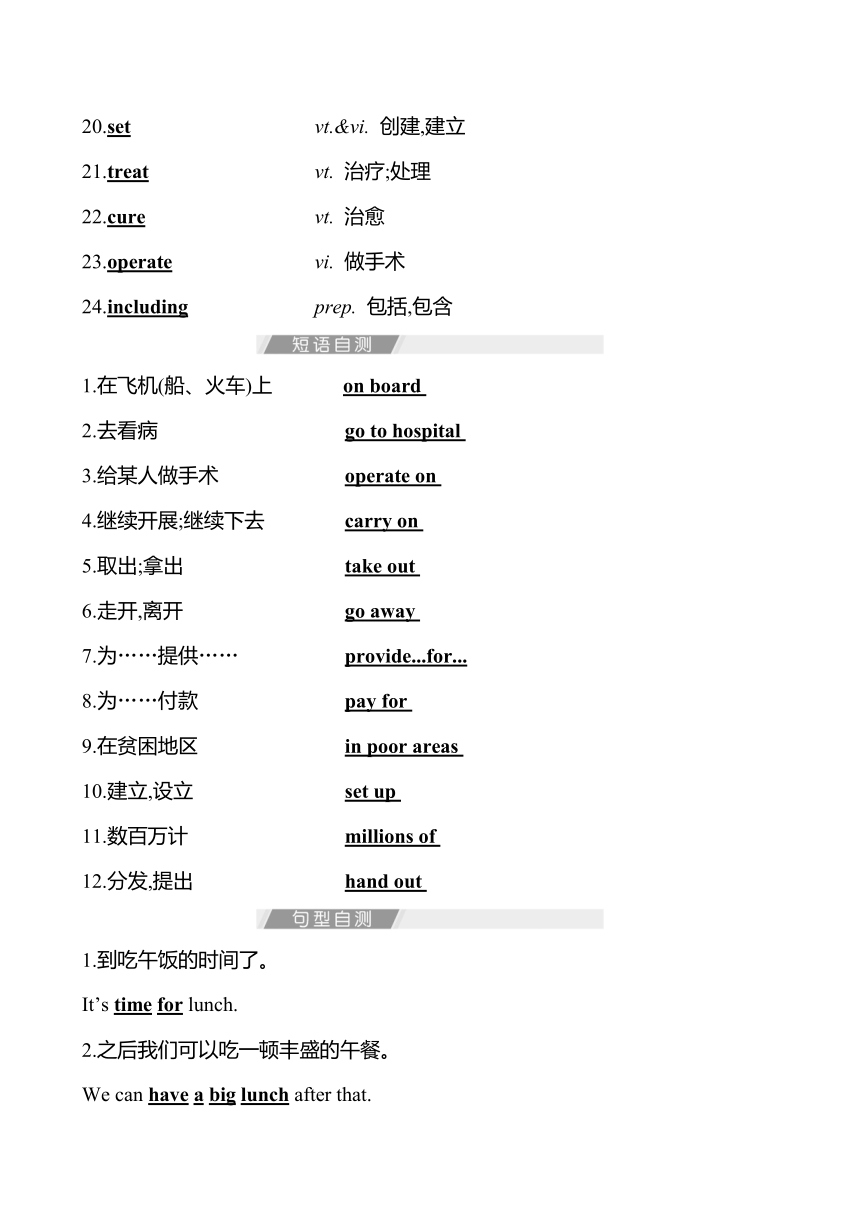Unit 7 International charities 知识清单 学案(含答案)初中英语牛津译林版八年级下册
文档属性
| 名称 | Unit 7 International charities 知识清单 学案(含答案)初中英语牛津译林版八年级下册 |

|
|
| 格式 | docx | ||
| 文件大小 | 33.6KB | ||
| 资源类型 | 教案 | ||
| 版本资源 | 牛津译林版 | ||
| 科目 | 英语 | ||
| 更新时间 | 2024-07-14 00:00:00 | ||
图片预览


文档简介
Unit 7 International charities
Comic strip & Welcome to the unit~Reading
1.education n. 教育
2.right n. 权利
3.spread n. 扩散;分布;展开
4.blindness n. 失明
5.patient n. 病人
6.reader n. 读者
7.interviewer n. 采访者
8.medicine n. 医学;药
9.case n. 病例;案例
10.treatment n. 治疗
11.leaflet n. 传单
12.basic adj. 基本的
13.medical adj. 医学的;医疗的
14.equal adj. 平等的
15.especially adv. 特别,尤其
16.mostly adv. 主要地,大部分地
17.afford vt. 买得起;能做
18.develop vi.&vt. 发展;加强
19.hold vt. 举行
20.set vt.&vi. 创建,建立
21.treat vt. 治疗;处理
22.cure vt. 治愈
23.operate vi. 做手术
24.including prep. 包括,包含
1.在飞机(船、火车)上 on board
2.去看病 go to hospital
3.给某人做手术 operate on
4.继续开展;继续下去 carry on
5.取出;拿出 take out
6.走开,离开 go away
7.为……提供…… provide...for...
8.为……付款 pay for
9.在贫困地区 in poor areas
10.建立,设立 set up
11.数百万计 millions of
12.分发,提出 hand out
1.到吃午饭的时间了。
It’s time for lunch.
2.之后我们可以吃一顿丰盛的午餐。
We can have a big lunch after that.
3.我太虚弱,走不动了。
I’m too weak to walk any further.
4.它为贫困地区的孩子提供基础教育。
It provides basic education for children in poor areas.
5.还有其他的方式帮助他们吗
Are there any other ways to help them
6.我们的许多病人承担不起看病的费用,所以我们得去他们那里。
Many of our patients can’t afford to go to hospital, so we have to go to them.
7.我为帮助人们重见光明而且改善他们的生活而自豪。
I’m proud to help people see again and improve their lives.
8.通过培训他们,我们希望帮助更多的人。
By training them, we hope to help more people.
9.乐施会于1942年在英国成立。第一个乐施会商店在1948年开业。
Oxfam was set up in the UK in 1942 ,and the first Oxfam shop was opened in 1948.
10.在它的帮助下,全国数以百万计的贫穷的孩子接受到基础教育。
With its help, millions of poor children all over the country were given basic education.
Grammar ~ Self-assessment
1.war n. 战争
2.matter n. 事情,问题
3.check n. 检查
4.secretary n. 秘书
5.India n. 印度
6.officer n. 官员
7.organize vt. 组织
8.pale adj. 苍白的
1.决定 make up one’s mind
2.担任某项工作 work as
3.因为,由于 because of
4.阻止某人某事 prevent sb. from sth./doing sth.
5.搜查 search for
6.在……末端 at the end of
7.习惯于某事 get used to
8.害怕某事 be afraid of
9.培训为 train as
10.了解,熟知 learn about
11.建设,建立 set up
1.每天三次,饭后服药。
Take this medicine after meals three times a day.
2.几天后你就会好的。
You’ll be all right in a few days.
3.他不过就我小手指那么大点!
He was the same size as my little finger!
4.他们很吵闹,因此我必须大声说话。
They were making a lot of noise so I had to speak loudly.
5.她害怕飞行。
She was afraid of flying.
6.因此她决定接受护士培训。
So she made up her mind to train as a nurse.
7.她习惯于乘飞机旅行。
She is getting used to travelling by plane.
8.她的钱不如以前多,但是她认为她的生活更有意义。
She does not have as much money as before, but she thinks her life is more meaningful.
9.春天植树。
Trees are planted in spring.
Comic strip & Welcome to the unit~Reading
1.education n. 教育
2.right n. 权利
3.spread n. 扩散;分布;展开
4.blindness n. 失明
5.patient n. 病人
6.reader n. 读者
7.interviewer n. 采访者
8.medicine n. 医学;药
9.case n. 病例;案例
10.treatment n. 治疗
11.leaflet n. 传单
12.basic adj. 基本的
13.medical adj. 医学的;医疗的
14.equal adj. 平等的
15.especially adv. 特别,尤其
16.mostly adv. 主要地,大部分地
17.afford vt. 买得起;能做
18.develop vi.&vt. 发展;加强
19.hold vt. 举行
20.set vt.&vi. 创建,建立
21.treat vt. 治疗;处理
22.cure vt. 治愈
23.operate vi. 做手术
24.including prep. 包括,包含
1.在飞机(船、火车)上 on board
2.去看病 go to hospital
3.给某人做手术 operate on
4.继续开展;继续下去 carry on
5.取出;拿出 take out
6.走开,离开 go away
7.为……提供…… provide...for...
8.为……付款 pay for
9.在贫困地区 in poor areas
10.建立,设立 set up
11.数百万计 millions of
12.分发,提出 hand out
1.到吃午饭的时间了。
It’s time for lunch.
2.之后我们可以吃一顿丰盛的午餐。
We can have a big lunch after that.
3.我太虚弱,走不动了。
I’m too weak to walk any further.
4.它为贫困地区的孩子提供基础教育。
It provides basic education for children in poor areas.
5.还有其他的方式帮助他们吗
Are there any other ways to help them
6.我们的许多病人承担不起看病的费用,所以我们得去他们那里。
Many of our patients can’t afford to go to hospital, so we have to go to them.
7.我为帮助人们重见光明而且改善他们的生活而自豪。
I’m proud to help people see again and improve their lives.
8.通过培训他们,我们希望帮助更多的人。
By training them, we hope to help more people.
9.乐施会于1942年在英国成立。第一个乐施会商店在1948年开业。
Oxfam was set up in the UK in 1942 ,and the first Oxfam shop was opened in 1948.
10.在它的帮助下,全国数以百万计的贫穷的孩子接受到基础教育。
With its help, millions of poor children all over the country were given basic education.
Grammar ~ Self-assessment
1.war n. 战争
2.matter n. 事情,问题
3.check n. 检查
4.secretary n. 秘书
5.India n. 印度
6.officer n. 官员
7.organize vt. 组织
8.pale adj. 苍白的
1.决定 make up one’s mind
2.担任某项工作 work as
3.因为,由于 because of
4.阻止某人某事 prevent sb. from sth./doing sth.
5.搜查 search for
6.在……末端 at the end of
7.习惯于某事 get used to
8.害怕某事 be afraid of
9.培训为 train as
10.了解,熟知 learn about
11.建设,建立 set up
1.每天三次,饭后服药。
Take this medicine after meals three times a day.
2.几天后你就会好的。
You’ll be all right in a few days.
3.他不过就我小手指那么大点!
He was the same size as my little finger!
4.他们很吵闹,因此我必须大声说话。
They were making a lot of noise so I had to speak loudly.
5.她害怕飞行。
She was afraid of flying.
6.因此她决定接受护士培训。
So she made up her mind to train as a nurse.
7.她习惯于乘飞机旅行。
She is getting used to travelling by plane.
8.她的钱不如以前多,但是她认为她的生活更有意义。
She does not have as much money as before, but she thinks her life is more meaningful.
9.春天植树。
Trees are planted in spring.
